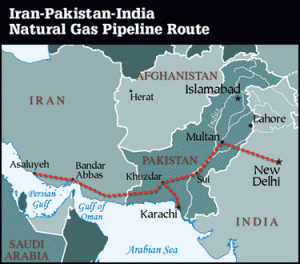On the 11th of March, Presidents Mahmoud Ahmadinejad of Iran and Asif Ali Zardari of Pakistan inaugurated the construction of a pipeline to take natural gas from Iran to Pakistan. The move, which is part of an effort to alleviate the power shortages in Pakistan, has drawn sharp criticism from the United States due to the Iranian involvement.

The pipeline has been under construction for some time already. Iran has reported that it has finished construction on its side of the border—some 1,150 kilometers of pipeline which run from the gas fields of southern Iran. Pakistan will complete the project by laying the remaining 750 kilometers in its own territory.
Highest among most concerns regarding the project is the possibility that Pakistan will be unable to afford the pipeline. Its main funding comes from two separate $500 million loans from the governments of Iran and China. The remaining cost will ostensibly be met by user fees.
Another concern is security. The pipeline will cut through the Balochistan region of Pakistan, which has been a hotbed of terrorist attacks in recent years, and attacks have shown a tendency to favor pipelines.
The pipeline risks incurring international sanctions due to the Iranian involvement in the project. The Pakistani government has insisted that their need for power outweighs their fear of international repercussions, as there are places within Pakistan which go for multiple hours without power every day, and the problem has been getting worse over time. The United States has suggested several other strategies to the Pakistani government in the past few years. The most prominent of these has been a pipeline from Turkmenistan to Pakistan. However, the Pakistani government has insisted that production on such a pipeline would take too long, considering the extreme nature of their present power shortages.
Iran is beset by numerous international sanctions as a consequence of its pursuit of nuclear technology. Many governments have expressed concern that Iran is developing nuclear bombs. Ahmadinejad insists that the pipeline at least should not incur the sanctions, as it is not possible to build a nuclear bomb out of a gas pipeline.
The pipeline is a popular move in Pakistan as it provides an expedient solution to their incessant power shortages, and because it is in direct defiance of the United States to find an alternative. Although the United States provides millions of dollars of aid to Pakistan, its drone strikes and other efforts against al-Qaida and the Taliban in the region have left it highly unpopular among the Pakistani people.
Planning on the project started back in 1994, but it has faced numerous delays. The Pakistani and Iranian governments hope to have the pipeline complete by 2014, but as it has faced numerous setbacks in the past nine years and skepticism is high.
Although the pipeline itself has been planned for a long time, the timing of Monday’s ceremony was highly political. Pakistan’s elections will be held next month, and so the ceremony was likely motivated by a desire to kindle support by the currently-dominant Pakistani People’s Party (PPP). Its main rival is the Pakistan Muslim League-N (PML-N), which has ties to the strongly anti-Iranian government of Saudi Arabia. Because of the pipeline’s popularity, the PML-N will be put in the tight spot of appeasing its allies in Saudi Arabia or continuing the project and keeping its people happy.
